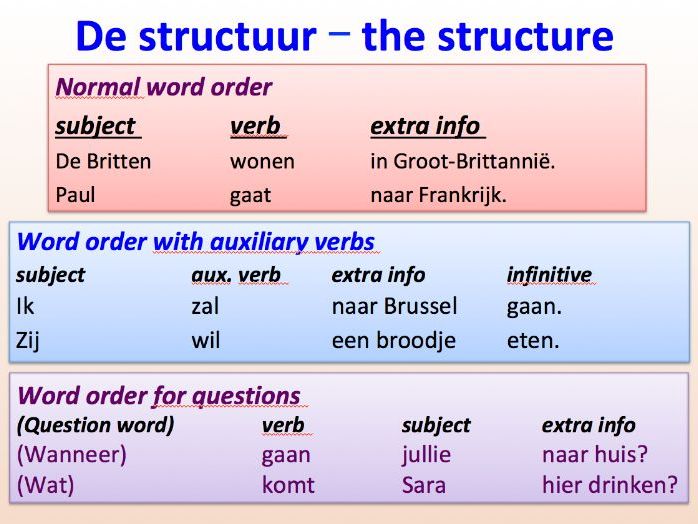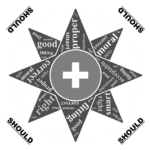Dutch Modal auxiliaries, verbs plus infinitive. A worksheet on Modal auxiliaries, verbs plus infinitive in Dutch with grammar explanations and exercises.
Dutch Modal auxiliaries, verbs plus infinitive.
An auxiliary verb is literally a ‘helping verb’ as it supports other verbs grammatically. Auxiliary verbs are used for example when forming the perfect tense and the passive voice of ‘normal’ verbs, i.e. main verbs (also called ‘lexical verbs’). All modal verbs are auxiliary verbs.
Some examples of auxiliary verbs are:Perfect tenseIk ben nog nooit naar Frankrijk geweest.
I have never been to France. Passive voiceKoninginsdag wordt gevierd op 27 april.
King’s day is celebrated on 27 April.
[King’s day = official celebration of the Dutch king’s birthday] Modal verb
Mag ik jouw e-mailadres hebben?
May I have your e-mail address?

The modal verbs form a special category of Dutch verbs. They verbs are usually used with the infinitive of another verb to express ability or possibility (kunnen), obligation (moeten), permission (mogen) or volition (willen). The verb zullen (‘shall’) can also be seen as a modal verb. However, it is dealt with separately under:
- Future aspect
- Modal verbs: zou
Hoeven te is also a modal verb, but is a special case because it is always accompanied by a negative element. It is dealt with separately under:
- Modal verbs: hoeven te
All modal verbs are irregular, but moeten is only irregular in the past tense and willen only in the present tense.
Modal verbs can be used independently, i.e. without the infinitive of another verb. However, in those cases, an infinitive can usually be added.Wil je een ijsje?
Do you want an ice cream? Wil je een ijsje hebben?
Do you want to have an ice cream?
When the infinitive of another verb is used along with the modal verb, the infinitive takes the last or penultimate place in the clause.
Kunnen
The verb kunnen expresses ability or possibility, and can be translated with ‘to be able to’ and ‘can’.Je kan bij de Erasmus Universiteit alleen sporten met een sportkaart.
You are only able to do sports at the Erasmus University with a sports card. Kun je de kaas snijden?
Can you cut the cheese? Kunnen we helpen?
Can we help?
Kunnen is irregular in the present tense:
| ik | kan | I can |
| jij | kunt/kan | you (informal) can |
| u | kunt/kan | you (formal) can |
| hij/zij | kan | he/she can |
| wij | kunnen | we can |
| jullie | kunnen | you (informal) can |
| u | kunt/kan | you (formal) can |
| zij | kunnen | they can |
The choice between kan or kunt (for jij and u) is arbitrary and depends on personal or even contextual choice. However, some people consider kunt to be more formal than kan and will restrict the use of kan to spoken language.
Moeten
The verb moeten expresses obligation, and can be translated with ‘to have to’ or ‘must’.Je moet de Belgische frieten eens proberen.
You have to try the Belgian chips. Alan en Simone moeten eerst een baan reserveren.
Alan and Simone have to book a tennis court first.
Moeten is regular in the present tense.
Mogen
The verb mogen expresses permission, and can be translated with ‘to be allowed to’ or ‘may’.Luuk mag vanavond om negen uur naar bed.
Luuk is allowed to go to bed at nine o’clock tonight. Mogen we jouw strippenkaart lenen?
May we borrow your bus ticket?
Mogen is irregular in the present tense:
| ik | mag | I may |
| jij | mag | you (informal) may |
| u | mag | you (formal) may |
| hij/zij | mag | he/she may |
| wij | mogen | we may |
| jullie | mogen | you (informal) may |
| u | mag | you (formal) may |
| zij | mogen | they may |
Willen
The verb willen expresses volition, and can be translated with ‘to want to’. Note that willen cannot be translated with ‘will’.Alan wil met Simone tennissen.
Alan wants to play tennis with Simone. Wat willen jullie drinken?
What do you want to drink?
Willen is irregular in the present tense:
| ik | wil | I want to |
| jij | wilt/wil | you (informal) want to |
| u | wilt/wil | you (formal) want to |
| hij/zij | wil | he/she wants to |
| wij | willen | we want to |
| jullie | willen | you (informal) want to |
| u | wilt/wil | you (formal) want to |
| zij | willen | they want to |
The choice between wil or wilt (for jij and u) is arbitrary and depends on personal or even contextual choice. However, some people consider wilt to be more formal than wil and restrict the use of wil to spoken language.
Level
This lesson can be used for adults from elementary to intermediate levels.
Aim
The aim of this lesson is to learn Modal auxiliaries, verbs plus infinitive in Dutch
Preparation
First print out the worksheet, then copy a worksheet for each student in the class.
Procedure
Go through the grammar and exercises together.








